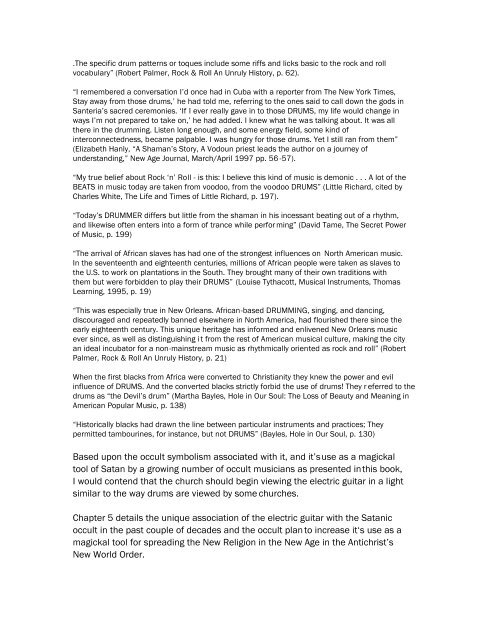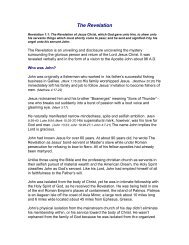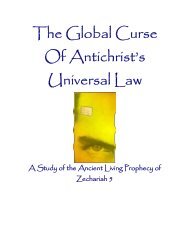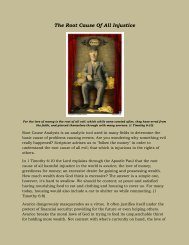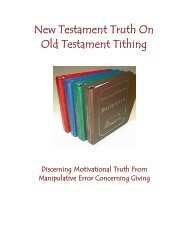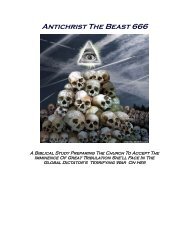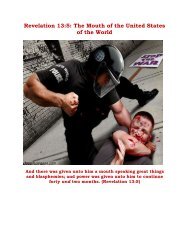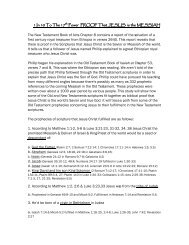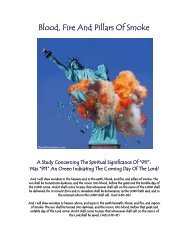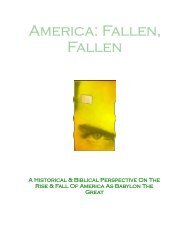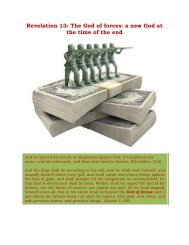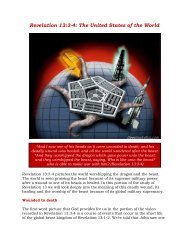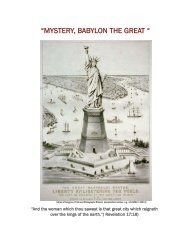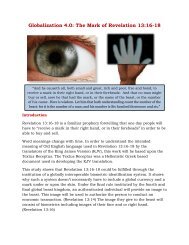the purpose driven music paradigm - Escape Babylon's Demons
the purpose driven music paradigm - Escape Babylon's Demons
the purpose driven music paradigm - Escape Babylon's Demons
You also want an ePaper? Increase the reach of your titles
YUMPU automatically turns print PDFs into web optimized ePapers that Google loves.
.The specific drum patterns or toques include some riffs and licks basic to <strong>the</strong> rock and roll<br />
vocabulary” (Robert Palmer, Rock & Roll An Unruly History, p. 62).<br />
“I remembered a conversation I’d once had in Cuba with a reporter from The New York Times,<br />
Stay away from those drums,’ he had told me, referring to <strong>the</strong> ones said to call down <strong>the</strong> gods in<br />
Santeria’s sacred ceremonies. ‘If I ever really gave in to those DRUMS, my life would change in<br />
ways I’m not prepared to take on,’ he had added. I knew what he was talking about. It was all<br />
<strong>the</strong>re in <strong>the</strong> drumming. Listen long enough, and some energy field, some kind of<br />
interconnectedness, became palpable. I was hungry for those drums. Yet I still ran from <strong>the</strong>m”<br />
(Elizabeth Hanly, “A Shaman’s Story, A Vodoun priest leads <strong>the</strong> author on a journey of<br />
understanding,” New Age Journal, March/April 1997 pp. 56 -57).<br />
“My true belief about Rock ‘n’ Roll - is this: I believe this kind of <strong>music</strong> is demonic . . . A lot of <strong>the</strong><br />
BEATS in <strong>music</strong> today are taken from voodoo, from <strong>the</strong> voodoo DRUMS” (Little Richard, cited by<br />
Charles White, The Life and Times of Little Richard, p. 197).<br />
“Today’s DRUMMER differs but little from <strong>the</strong> shaman in his incessant beating out of a rhythm,<br />
and likewise often enters into a form of trance while perfor ming” (David Tame, The Secret Power<br />
of Music, p. 199)<br />
“The arrival of African slaves has had one of <strong>the</strong> strongest influences on North American <strong>music</strong>.<br />
In <strong>the</strong> seventeenth and eighteenth centuries, millions of African people were taken as slaves to<br />
<strong>the</strong> U.S. to work on plantations in <strong>the</strong> South. They brought many of <strong>the</strong>ir own traditions with<br />
<strong>the</strong>m but were forbidden to play <strong>the</strong>ir DRUMS” (Louise Tythacott, Musical Instruments, Thomas<br />
Learning, 1995, p. 19)<br />
“This was especially true in New Orleans. African-based DRUMMING, singing, and dancing,<br />
discouraged and repeatedly banned elsewhere in North America, had flourished <strong>the</strong>re since <strong>the</strong><br />
early eighteenth century. This unique heritage has informed and enlivened New Orleans <strong>music</strong><br />
ever since, as well as distinguishing i t from <strong>the</strong> rest of American <strong>music</strong>al culture, making <strong>the</strong> city<br />
an ideal incubator for a non-mainstream <strong>music</strong> as rhythmically oriented as rock and roll” (Robert<br />
Palmer, Rock & Roll An Unruly History, p. 21)<br />
When <strong>the</strong> first blacks from Africa were converted to Christianity <strong>the</strong>y knew <strong>the</strong> power and evil<br />
influence of DRUMS. And <strong>the</strong> converted blacks strictly forbid <strong>the</strong> use of drums! They r eferred to <strong>the</strong><br />
drums as “<strong>the</strong> Devil’s drum” (Martha Bayles, Hole in Our Soul: The Loss of Beauty and Meaning in<br />
American Popular Music, p. 138)<br />
“Historically blacks had drawn <strong>the</strong> line between particular instruments and practices; They<br />
permitted tambourines, for instance, but not DRUMS” (Bayles, Hole in Our Soul, p. 130)<br />
Based upon <strong>the</strong> occult symbolism associated with it, and it’s use as a magickal<br />
tool of Satan by a growing number of occult <strong>music</strong>ians as presented in this book,<br />
I would contend that <strong>the</strong> church should begin viewing <strong>the</strong> electric guitar in a light<br />
similar to <strong>the</strong> way drums are viewed by some churches.<br />
Chapter 5 details <strong>the</strong> unique association of <strong>the</strong> electric guitar with <strong>the</strong> Satanic<br />
occult in <strong>the</strong> past couple of decades and <strong>the</strong> occult plan to increase it‘s use as a<br />
magickal tool for spreading <strong>the</strong> New Religion in <strong>the</strong> New Age in <strong>the</strong> Antichrist’s<br />
New World Order.


